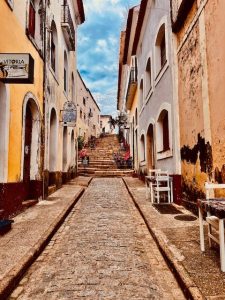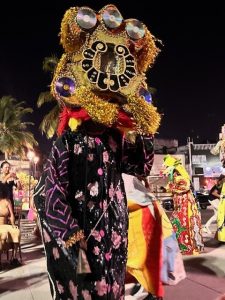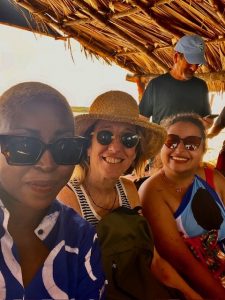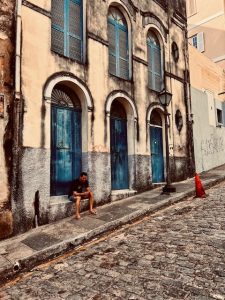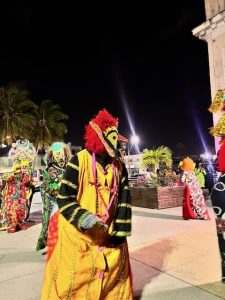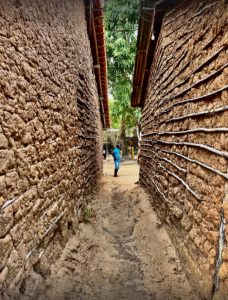#ShiftThePower without make-up
15 Jan 2025
The 2024 Cazumbada[1] was a journey into brutal honesty.
There was no staging.
There was no show for donors or colleagues. There was no story-telling.
There was an experience of the real, of the failure of the system, and of the infinite challenges for communities to create alternative responses and fight for their rights.
There were no fancy hotels, no fancy meals, no fancy transport.
Sometimes there was not even running water.
There was no hierarchy.
There was a lot of music, a lot of singing and a lot of laughter.
There were the basics and the important things that kept the collective hope alive.
There was commitment, tenacity and a horizon of struggle.
We were the same and we were in the same mud.
There was a we are trying to come out strong together and there was a we are all trying.
There was we are putting everything we have and we were all the same in the same places.
There was knitting, darning and collective embroidery.
There was solidarity and generosity in every step and gesture.
We were taken to a strange and sometimes quite uncomfortable place.
But perhaps this strangeness was necessary.
Perhaps what does not cause strangeness in our bodies cannot transform us.
We were in a place where something good can happen, something good can happen when we are together. We lived a choreography of another possible way of being and sharing. A space where power is shared because it does not belong to anyone in particular and it belongs to everyone at the same time.
The Cazumbada 2024 was a meeting that lasted three whole days. Whole days because they started very early in the morning and ended very late at night. Hours and hours of conversations in twos, threes and groups, all unexpected, spontaneous and between people who mostly did not know each other.
We came from places as different as San Francisco and Gaborone, Chiapas and New Orleans, Buenos Aires and San Jose, the Atlantic Forest and Abuja. We talked for hours on the bus, which allowed us to see and breathe the interior of Maranhão, and over lunch under the chestnut trees, climbing up to cut mangoes and eating them standing up. We shared experiences in a popular dining room on the side of a road, and at the opening party in a huge triangular square in the middle of two wide avenues, where cars and trucks passed by on a very starry night. We shared rhythms in the dances of the community parties, sweating drops that fell to the ground, and in the walks in flip-flops along the Amazon trails. We helped each other on the barge that took us from Cujupe for more than an hour, and on the boat made of worn wood and without life jackets that crossed us. We often held hands to keep going despite the steepness of the route, or when the heat and the land made it difficult to breathe and the bites reddened our unfamiliar skin.
The three days of the Cazumbada were always outdoors, in the streets of orange earth that flew until it covered the green plants that marked the limits of the passage with ochre, in the open spaces of the villages, in the clearing of a local community in the Amazon bush, under a thatched roof in the white sand and on the land around an imaginary stage in the Buritirana Agro-Ecological Park.
There were no fixed seats anywhere. Nor chairs for some and armchairs for others.
Nor special rooms. Not even individual rooms.
We were all the same. Colleagues in the beginning, allies in the middle and cronies in the end.
The food was always simple, tasty and plentiful. Many different dishes that told of the customs and identity of the region, generously presented on huge trays with farofa de carne seca, tarta de camarao, de peixe frito, bobó and vatapá. There was a lot of “care”, translated into simple and everyday gestures such as plenty of cold and drinking water, the constant smile and the palm of the hand resting affectionately on the shoulder, which accompanied the daily question: “How are you today?”
There was no predetermined work agenda, no structures that conditioned thought and action. Each day was an invitation to an unfolding of experiences that emerged as a result of invisible interconnections, of exchanges with and between the communities with which we share time and space.
There were no protagonists, no feathers, no authorities.
We were all supporting actors, without pre-formatted texts, adapting to each moment, always ready to accompany and participate in a world understood from another point of view, a view in which the human being is not the centre.
There were no costumes, no clothes, no make-up.
We were deprived of almost all our daily habits, including mobile phones.
There were no absolute certainties, no lessons to be learned, no expected quantitative results. There was no “social impact” or “social venture capital” or “impact investing” or delusions of scalability. Quite the opposite, conversations were filled with words like “power”, “justice” and “dignity.”
We sat, watched and shared, and we were all that we are, people confronted with an uncomfortable truth that frustrates and hurts.
In Maranhão, the ebb and flow of the tides is the largest in Brazil and the third largest in the world. The Cazumbada 2024, like the tides of Maranhão when they go out, reveals all that is hidden beneath the water: the deep scars of a violated, exploited and plundered land and the daily struggle of its people, especially the women, against its destruction.
By: Florencia Roitstein, Executive Director, Ellas – Mujeres y Filantropía and 2023/2024 #ShiftThePower Fellow.
[1] From December 3 to 6, 2024, the Instituto Baixada and the Formação Institute invited its institutional partners and friends to the Cazumbada, an event held in Baixada Maranhense, Brazil, which seeks to immerse participants in the culture and territory of the region. Cazumbá is a folkloric figure that evokes a mixture of emotions, such as fear, annoyance and fun. He is characterized by his striking mask and his colorful and elaborate costumes.


